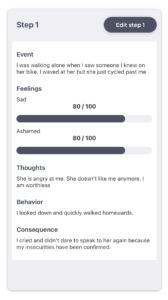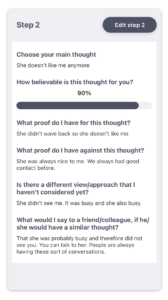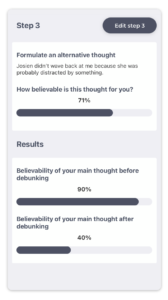Your interpretation of events influences how you feel, and, in turn, these feelings can play a role in how you behave. By challenging your thoughts, you will investigate how your thoughts affect your feelings and behaviour. You can also assess whether your perspective is rational and appropriate for the event.
In the NiceDay app, you can fill in a thought record to challenge your thoughts.
You can find an example and explanation below:
Of all the thoughts you have written down in your Thought Record, choose the thought that most strongly evokes negative feelings; this is the most important automatic negative thought.
And this is the thought you can challenge.
How credible is this thought to you on a scale of 0-100?
To challenge your thoughts, you can ask yourself a number of standard questions. Write down the answers.
The questions you can ask yourself are:
- What proof do I have for this thought?
- What proof do I have against this thought?
- What is the worst that can happen? Would I be able to get over that?
- What are the advantages and disadvantages of this thought?
- Is there a different view/approach that I haven’t considered yet?
- What would I say to a friend/colleague, if he/she was having a similar thought?
- If my best friend, family member or colleague would know I am having this thought, what would he/she say to me?
- How would I think about this in a week/month/year?
Some extra questions you can ask yourself outside the app are:
- What is the best possible outcome?
- What is the most realistic outcome?
- How does my way of thinking affect me?
- What effect would a different perspective have?
- What can I do to change this thought? What actions are needed?
Formulate a realistic alternative thought on the situation. What is the credibility of this thought on a scale of 0-100?
If you challenge the thought with an alternative and helpful thought during an unpleasant situation, you will notice that the subsequent behaviour and corresponding consequences change. What you ultimately feel is also different, namely “I don’t feel bad about it anymore”.
Example:



If you challenge the thought with an alternative and helpful thought during an unpleasant situation, you will notice that the subsequent behaviour and corresponding consequences change. What you ultimately feel is also different, namely “I don’t feel bad about it anymore”.
Sources: Keijsers, G. P. J., Van Minnen, A., Verbraak, M., Hoogduin, C. A. L. & Emmelkamp, P., (2017). Protocollaire behandelingen voor volwassenen met psychische klachten.

 Print
Print 
